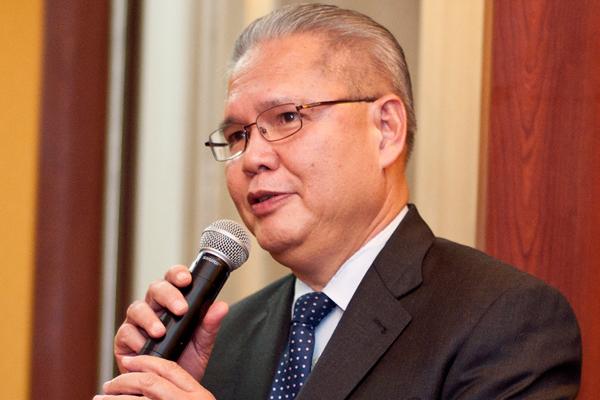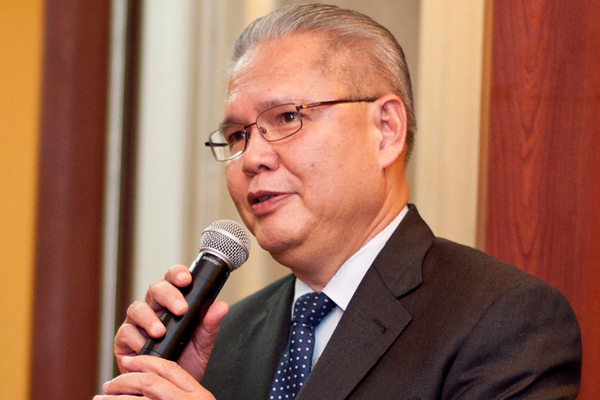
Rafael Morales, Managing Partner of SyCip, Salazar, Hernandez & Gatmaitan, Philippines’ largest law firm, speaks to Kanishk Verghese about the firm’s growth strategy, the onset of the ASEAN Economic Community and other economic initiatives, and the possibility of legal market liberalisation in the Philippines.
ALB: How would you describe your strategy for SyCip during your stint as managing partner of the firm?
Morales: It is fundamental for me to ensure that during my watch, SyCipLaw remains as the largest and the leading law firm in the Philippines, while adhering to integrity and excellence as the cornerstones of our legal practice. Here, I have to recognise the fact that some associates do not stay very long in law firms, and I understand that is a universal phenomenon and a common trait among millennials in the legal staff. Given the competition from other law firms, our hiring committee makes a determined effort regularly to recruit the best and the brightest from the top law schools in the country, as early as practicable – which means even before the commencement exercises in those schools and definitely prior to the qualifying bar examinations – and offer them generous financial packages. Then, the new legal assistants are initially made to undergo a structured training programme to introduce and expose them to the various practice areas in the firm. It is only after that training that they can choose practice areas in which they want to specialise. We do not usually hire laterally, unless there is a need for it or the individual is exceptional.
Apart from being the largest law firm, we have to maintain our standing as the leading full-service firm in the Philippines, so our legal staff members are constantly monitored and evaluated for their performance. All in all, the strategy is simply to maintain the leading role and position of the firm in the Philippine legal profession.
ALB: What have been the key focus areas for SyCip this year?
Morales: We have focused on maintaining our pre-eminence in banking and finance, capital markets, energy and infrastructure, mergers and acquisitions, intellectual property, and dispute resolution, among other practice areas. We have, in fact, strengthened our arbitration practice and are continuing to develop our Islamic banking and finance capability.
The firm is now in its 70th year. As part of our celebration, we have been holding workshops on a number of topics with clients. We intend to be around for another 70 years.
ALB: What is your outlook for the business and legal market in the Philippines in 2016? What are the key growth areas and opportunities for the firm in the year ahead?
Morales: The outlook for 2016 is bright. We foresee the implementation of many infrastructure projects now still in the pipeline. The energy sector will be a key growth area, along with a resurgent capital market. The banking sector will likely witness more consolidations as local banks strive to be compliant with Basel-based capital adequacy requirements. There will be more and more arbitration cases as contracting parties feel less and less comfortable with protracted court litigation.
ALB: With the onset of the ASEAN Economic Community, as well as a number of other economic initiatives (e.g. China’s ‘One Belt, One Road’ policy, Trans-Pacific Partnership), how is the firm positioning itself to benefit from these opportunities?
Morales: The developments you mentioned would mean more legal work for the firm, but it is necessary to know the ins and outs of the underlying agreements. So it is imperative for us to boost our expertise in these matters. As trade barriers continue to come down between and among member countries, new rules of doing business across sectors will emerge and law firms will have to help clients navigate the maze.
ALB: As cross-border activity within Asia continues to increase, we have seen a number of mergers and formal alliances among law firms in the region. Is this something that SyCip might consider in the near future?
Morales: A merger is not in SyCipLaw’s horizon, but we will not close the door if there is a good fit. It is more important to have the same culture rather than just aiming to be bigger. Also, we see ourselves as continuing as an independent law firm rather than being absorbed in a merger.
ALB: How has the legal market in the Philippines developed during your time in the legal profession?
Morales: The legal market has changed and the transformation is continuing. Several legal futurists have sketched what the legal profession or market might be in the years to come. Law firms face competition not only within their own circle but from accountants and other non-legal professionals as well. In-house legal teams have become more and more robust and can dispense increasingly with external counsel’s advice on many cases. Global and regional law firms have been extending their reach in jurisdictions that opened their doors because of the WTO’s General Agreement on Trade in Services. The Philippines is similarly expected to open its doors, perhaps sooner rather than later.
ALB: How do Philippine law firms currently compare with their peers within Asia, or even internationally? What are some of the international standards that SyCip aspires to?
Morales: Philippine law firms and lawyers are at par with their peers in the region and internationally. Becoming a full-fledged lawyer in the Philippines is not a walk in the park. The march to a law degree, whether an LL.B. or a J.D., starts after a four-year college degree. Proper legal education takes an additional four years, and the bar examination after that is like running the gauntlet. At SyCipLaw, we have a number of lawyers with master’s degrees in law from reputable universities outside of the Philippines. Many of them also have working stints in law firms in the U.S., UK and Japan. As I have noted earlier, excellence in legal practice is a cornerstone of our firm.
ALB: Philippine companies like Robinsons, San Miguel and Jollibee, for example, are now becoming well known around the region. When can we expect to see Philippine law firms becoming similarly prominent outside of the country?
Morales: Going outside the country is an enticing option for us but we are very cautious about it. For now, we will continue to be a national law firm with four offices in the Philippines. Going international, or more accurately going regional, is an option that might become attractive for us once the practice of legal profession within the ASEAN is liberalised. The Philippines, for one, would eventually open up its doors to non-Philippine law firms and lawyers. But even as we wait for liberalisation, we are testing the legal waters in Myanmar as a potential starting point.
ALB: In your opinion, what are some of the challenges that 2016 and beyond hold, and how does the firm intend to tackle these issues?
Morales: The challenges we faced this year and the years before – such as clients’ demand for lower or capped fees, competition from boutique firms, increasing dependence of clients on their in-house lawyers, etc. – will not disappear next year. We also anticipate the opening of the legal market in the Philippines to foreign lawyers in the near future. There will be challenges but opportunities as well. We are ready as always to face the challenges and seize the opportunities that come along.
CV |
1975 – 1981 |
Associate, SyCipLaw |
1981 – 1983 |
Senior Associate, SyCipLaw |
1983 – Present |
Partner, SyCipLaw |
1995 – 2010 |
Head - Banking, Finance & Securities Department, SyCipLaw |
2009 – Present |
Managing Partner, SyCipLaw |


